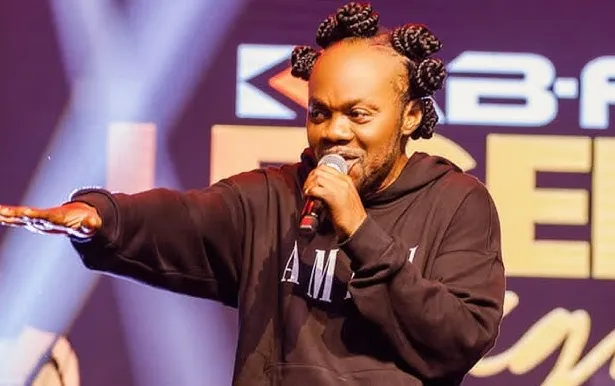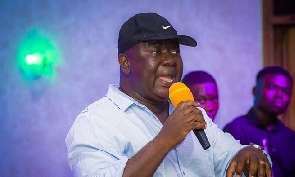Ghana, a nation steeped in rich traditions and vibrant cultural expressions, boasts an array of legends who have significantly contributed to its identity.
From musicians and artists to political leaders and sports figures, these individuals have shaped the fabric of Ghanaian society.
However, it is often the case that Ghanaians wait until these icons have passed away to fully recognize their contributions.
Renowned music producer and entertainment analyst Fred Kyei Mensah has urged Ghanaians to honor and celebrate their national icons while they are still alive.
He made this emotional appeal during a tribute to the late Highlife legend, Charles Kojo Fosu, popularly known as Daddy Lumba.
Mensah reflected on Lumba’s immense contribution to Ghana’s music industry and cultural identity, highlighting how the iconic singer shaped generations through his sound, storytelling, and unmatched artistry.
“Daddy Lumba’s impact goes beyond the studio. His music moved people, drove industries—from media to entertainment, and even the brewery sector. That’s not just cultural value; it’s economic impact.”
Fred Kyei Mensah
He emphasized the importance of society acknowledging and celebrating such influential figures while they are still alive. “Why wait until they’re gone to celebrate them?” he asked. “We should lift up our legends while they can still see and feel the love.”
His remarks come in the wake of the passing of Daddy Lumba on July 26, 2025, after a short illness—an event that has left the nation in mourning and sparked widespread reflection on the legacy of one of Ghana’s most cherished musicians.

Fred’s call serves as a poignant reminder: legacies are built in life, but they deserve to be honored in the now. Daddy Lumba may be gone, but the conversation around celebrating living legends has never been more relevant.
Celebrating legends while they are alive serves multiple purposes. Firstly, it acknowledges their contributions and sacrifices, providing them with the recognition they deserve.
For instance, figures like Kofi Annan, the late former Secretary-General of the United Nations, and contemporary artists like Sarkodie and Shatta Wale have made indelible marks on both the local and global stages.
By publicly honoring these individuals, Ghanaians express gratitude and appreciation, fostering a culture of recognition that encourages others to pursue greatness.
Moreover, recognizing legends while they are alive creates opportunities for mentorship and dialogue. When celebrated figures share their experiences and wisdom, they inspire the younger generation to strive for excellence.
This mentorship takes many forms, from workshops and public speaking engagements to collaborative projects that allow emerging talents to learn from established icons.
For example, initiatives like the “Ghana Music Awards” not only celebrate musicians but also encourage up-and-coming artists to follow in their footsteps, creating a continuous cycle of inspiration and achievement.
Honoring Legends Strengthens National Identity

Celebrating living legends also plays a crucial role in strengthening national identity. In a world where globalization often dilutes cultural uniqueness, honoring local icons instills a sense of pride in Ghanaian heritage.
Events such as festivals, award ceremonies, and public tributes serve as platforms to showcase the richness of Ghanaian culture and history. This collective celebration fosters unity among Ghanaians, transcending regional, ethnic, and social divides.
For instance, the annual “Ghana Independence Day Parade” not only commemorates the nation’s freedom but also highlights the contributions of various legends in different fields.
When Ghanaians come together to celebrate these figures, they reinforce their shared identity and collective memory, ensuring that the legacies of their heroes are woven into the nation’s narrative.
Meanwhile, in the digital age, media, and technology have the power to amplify the voices of living legends. Social media platforms, television shows, and podcasts serve as powerful tools for storytelling and recognition.
By utilizing these platforms, Ghanaians create a culture of appreciation that extends beyond traditional boundaries.
For instance, online campaigns celebrating the contributions of artists, athletes, and thinkers reach younger audiences, ensuring that the legacy of these figures is preserved and celebrated in contemporary contexts.

Furthermore, the media plays a pivotal role in documenting the lives and achievements of these legends. Biographies, documentaries, and interviews provide deeper insights into their journeys, challenges, and triumphs, making their stories accessible to all Ghanaians.
By investing in such narratives, the nation cultivates a sense of pride and ownership over its cultural icons.
Ghanaians must take proactive steps to celebrate their legends while they are alive. By recognizing their contributions, fostering mentorship, strengthening national identity, and leveraging media, the nation creates a culture of appreciation that not only honors its heroes but also inspires future generations.
Celebrating living legends is not just an act of recognition; it is a commitment to preserving the rich tapestry of Ghanaian culture and history for years to come.
As Ghanaians move forward, they must ensure that they celebrate legends today, so that their legacies continue to illuminate the path for tomorrow.
READ ALSO: NACOC Declares War on Illicit Drugs



















